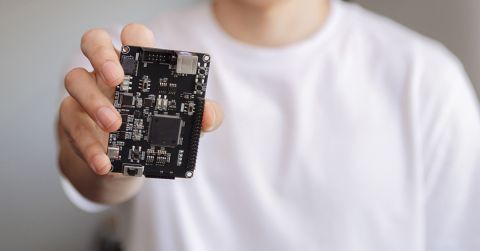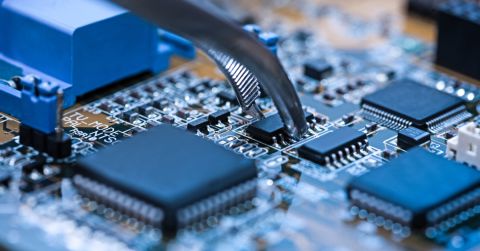Get to Know DD ElectroTech
On this episode of the CTRL+LISTEN Podcast, we welcome Debashis Das of the DD ElectroTech YouTube Channel. He and James chat about how Debashis got into engineering, what his favorite/most challenging designs were, the future of tech in India, and more.
Listen to the episode:
Watch this episode:
Key Highlights:
- Intro
- How Debashis Became an Engineer
- When Did Debashis Start Building
- Where New Engineers Should Start
- Most Challenging Design?
- Favorite Design?
- The Future of India Tech Industry
- Outro
Links and Resources
- Watch the recent episodes of Ctrl + Listen Podcast on the Octopart Youtube Channel
- Follow Octopart on LinkedIn
- Subscribe to @DDElectroTech Youtube Channel
- Connect with James Sweetlove on LinkedIn
Transcript
James Sweetlove: Hey, everyone, thank you for tuning in. This is another episode of the "Octopart CTRL+LISTEN Podcast". Today, I have Debashis Das. He's the host of the YouTube channel, DD ElectroTech based out of India. You may have heard of him if you're in the electronics industry. They have over 2 million subscribers, and over 261 million views on their YouTube channel, so if you haven't checked that out yet, definitely do, some great content on that. Thanks for coming on the show. Really appreciate you taking the time. It's really great to speak with you.
Debashis Das: Hello, James, thank you for inviting me on your show. It's a delight to be here.
James Sweetlove: So I'd love to know how did you become an engineer, and why? What led you to that career path?
Debashis Das: Actually, from my childhood, I loved to tinker and dismantle electronics gadgets, and by doing this, I destroyed a lot of items, but it was fun, and when I grew up, to follow this passion, I enrolled in an engineering college, and I really loved the hands-on classes, and it inspired me to build many small projects, and I enjoyed it so much that I even completed my friend's final year projects as well. And during my time in college, I started uploading all these videos on YouTube, and eventually, my journey of becoming an engineer led me to become a social media influencer where I follow my passion and educate others.
James Sweetlove: I think a lot of people probably share a similar story. Thanks for for sharing that. What made you start building your own technology? I mean, obviously, you have a passion for it, but where did that begin?
Debashis Das: Okay, actually, as I can remember, that actually, when I was kid, my dad gave me a RC car. The car looks gorgeous, and I really loved to play with it, but one day, it stopped working. It really broke my heart, so actually, I tried to fix it, but as I was then a kid, I don't have much knowledge, but I have a screwdriver, so actually, what I did, I removed everything, and I, surprisingly, I saw the circuit is same, which I already have in a broken car. So what I did, I just changed the circuit from the broken car, and it worked, and that day, I was the happiest child on the Earth. So actually, this is how my journey of loving electronics began.
James Sweetlove: It's great to see that your passion started at such a young age. I don't think you're alone in that aspect. Where should people start if they want to build their own tech? Is there a place that's sort of like, a good beginning point?
Debashis Das: If someone is new in this field, I think they should start from the beginning, because they have to learn the basics, like how each components works. So after learning the basic, they should try to make something small project, and the simple project, they should start from the basics, and when they build it, I would suggest everyone to combine those small projects to make something big, and it's relatively easy now, thanks to the internet, because nowadays, you know, that actually, free courses are in everywhere, but keep in mind one thing, that everything won't be as smoothly as you plan, so be ready to solve those problems.
James Sweetlove: Yeah, it's definitely great to see how many resources there are out there these days. It's come a long way. People can really pick a lot of stuff up online, and even a lot of it's free, which is fantastic. Some great resources out there.
Promotional Break: Altium 365 lets you hold the fastest design reviews ever. Share your designs from anywhere and with anyone with a single click. It's easy. Leave a comment tagging your teammate, and they'll instantly receive an email with a link to the design. Anyone you invite can open the design using a web browser. Using the browser interface, you're able to comment, markup, cross-probe, inspect, and more. Comments are attached directly to the project, making them viewable within in Altium Designer, as well as through the browser interface. Give it a try, and get started with Altium 365 today.
James Sweetlove: What was your most challenging builder design? You've been doing this for a while, I'm sure you've had some tough ones come up?
Debashis Das: A few years back, I built a RC car. I used to control this car using my Android phone. It sounds that ordinary car, but it is not a normal car. The car can climb on wall, even on ceiling, but it was quite challenging due to the weight limit, as the car was consist of 3D printing parts, and circuits, and motors, so including everything, the car was so heavy. So actually, my aim was to reduce the weight as low as possible, and to do that, I push my limit to make the circuit so tiny, and to reduce the weight even further, I sanded the whole structure, and after doing lot of things, finally, the car sticked on the wall, and it climbed, and even it ran on ceiling. It was quite challenging for me. If you haven't watched that video, please watch that video. It is on my channel. If you watch it carefully, you will understand that how challenge I faced to complete this project.
James Sweetlove: I wouldn't even know what to begin with that. Sounds incredibly complicated, but definitely need to watch that video. Sounds like a very interesting thing to witness. Well, what was your favorite build of design? I mean, that was your most challenging, but what did you enjoy the most?
Debashis Das: My favorite build? Actually, this is my favorite build. Not the phone. Actually, this is my iPhone 13 Pro Max. I converted this Lightning port into Type-C, and it is so convenient to have a USB-C, because in my office, and in my home, USB-C is lying around everywhere, so it's so much convenient to have a USB Type C. I completed this project a year ago, and the main funny thing is that I teased a lot of my friends, and a lot of people by showing that, look, my iPhone has USB-C, do you have that? And they were surprised to see it, and I really loved to see their reaction, but the sad thing is that actually, I no longer flex that, because recently, Apple announced their iPhone 15 series is coming with USB Type-C, but it was a lot of fun.
James Sweetlove: Well, I'm definitely jealous of that. I would love to have a USB Type-C in my iPhone. I think most people would. It's the logical choice, really, so Apple's catching up now, and doing the USB Type-C, but you beat them to it. You're ahead of the curve with that one. Bit of a bigger picture question here, but I definitely think people would love to know, where do you see India's tech industry going in the future?
Debashis Das: Interesting question. India is growing so fast in tech industries. People's are getting more interested in tech, and they are focusing on innovation. New entrepreneur and startups are evolving every day, especially in the fields like artificial intelligence, internet of things, machine learning, software development, and in various industries, and government is supporting by different initiatives, like Make in India, and Digital India, so I think, in future, India will be a very tough competitor to other tech developing countries in the world.
James Sweetlove: Yeah, honestly, it's been pretty fascinating to watch this unfold. I think that there kind of is limitless potential for growth for the Indian tech market. Obviously, they've been designing for so long, working in that industry. It's such a huge sector in India, but it's really fascinating to watch the actual production and manufacturing side of things really start to to expand and grow. Can't wait to see how that plays out in the future, and how it affects the global market. Well, thank you so much for coming on the show, and it was really great talking to you. Love to see someone so passionate about what they do. For anyone watching, definitely check out the channel. There's some fantastic content on there, really great stuff. If you're an engineer, it'd probably be really relevant. If you're not, it's gonna be really interesting. Even for myself who's not an engineer, I find a lot of your builds fascinating.
Debashis Das: Thank you again for inviting me. I really enjoyed this whole conversation, and I guess, everyone will like it.










